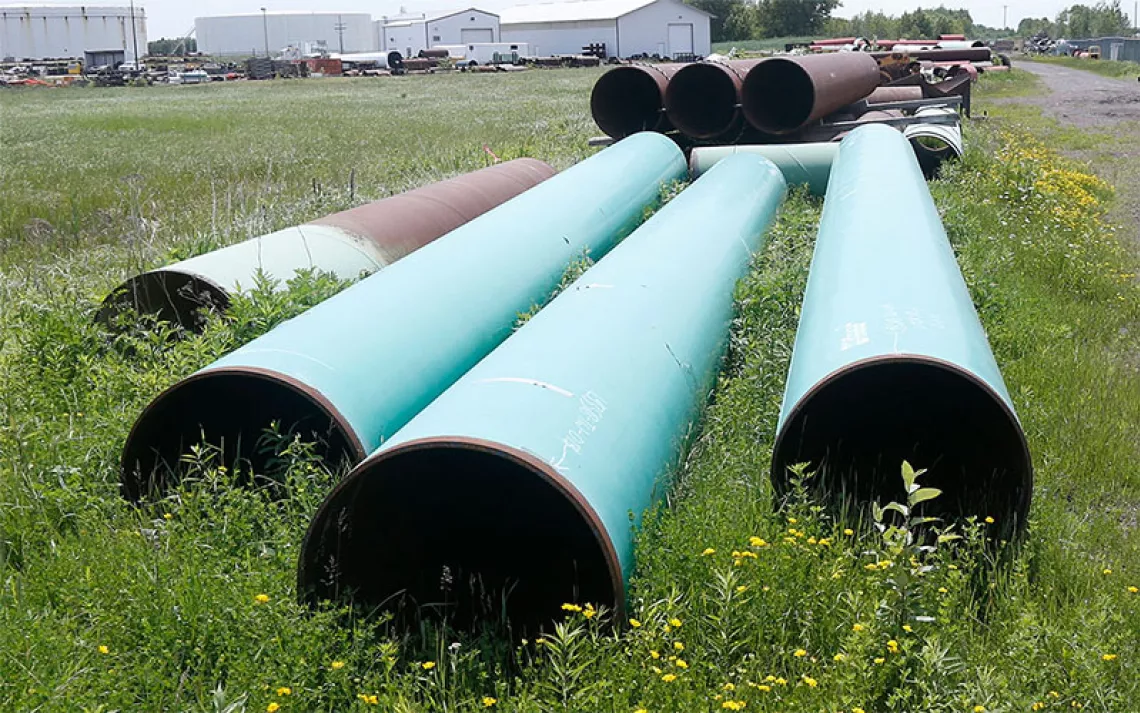The Atlantic Coast Pipeline: Risky and Costly . . . and Unnecessary
A string of court losses are making the gas pipeline increasingly expensive
Dominion Energy is determined to complete the controversial Atlantic Coast Pipeline, which if built would carry more than a billion cubic feet of fracked gas 600 miles from the mountains of Appalachia to North Carolina and the Virginia coast daily. But so far, Dominion and its partners are batting 0 for 4 when it comes to securing key construction permits for the project. A string of court decisions have stopped construction on the ACP, and the pipeline’s backers are hemorrhaging cash. Adding insult to injury, some energy analysts say it might not even be necessary.
The Fourth Circuit Court of Appeals in Richmond, Virginia, has thrown out nearly every permit needed to build the pipeline along its originally proposed path. In August 2018, the court ruled that the National Park Service violated its conservation mission when it permitted the pipeline to pass underneath the Blue Ridge Parkway, which would have carved a 50-foot-wide scar through the surrounding forest, visible from the popular Three Ridges overlook. Then, in November 2018, the Army Corps of Engineers suspended construction on the project after another adverse court ruling regarding the plans for the pipeline to cross more than 1,500 streams and rivers in West Virginia. Last December, the appeals court revoked a crucial US Forest Service permit needed to allow the pipeline to cut through two national forests and cross the Appalachian National Scenic Trail.
Most recently, a panel of federal appeals judges in July threw out a US Fish and Wildlife Service permit, ruling that the agency failed to consider how the pipeline would impact endangered species—including the Indiana bat and the Madison cave isopod, a small, eyeless crustacean that swims in flooded limestone caves beneath the Shenandoah Valley.
The serial setbacks have cost Dominion, which is building the pipeline with Duke Energy and Southern Company, money and its reputation. Each week that goes by without felling a tree or digging a trench costs up to $20 million. The project is now estimated to cost almost $8 billion—more than 50 percent higher than originally thought—with full operation pushed back to 2021. In February, Moody’s Investor Service changed its rating of the ACP to “credit negative,” citing the project's ballooning costs and delays.
“All of the ACP’s problems are entirely self-inflicted,” said Greg Buppert, a senior attorney for the Southern Environmental Law Center, which led the lawsuits against two of the pipeline’s permits. “It was never a good idea to build this pipeline through two national forests, a national park, across the Appalachian Trail, and through the steepest mountains in West Virginia.”
Dominion and Duke say public utilities in the Southeast need the pipeline to fuel a new generation of gas-fired electricity. But a report released earlier this year by the Institute for Energy Economics and Financial Analysis, “The Vanishing Need for the Atlantic Coast Pipeline,” concluded that the pipeline might not even be necessary—or profitable.
Since the pipeline was first proposed in 2014, demand for natural gas has plateaued and, according to Dominion’s own models, is only expected to decrease. Dominion and Duke have delayed or canceled plans to build new gas plants, and facilities just coming online say they can get all the energy they need from existing pipelines. Renewables like solar and wind are already cheaper than gas—in some cases by as much as 60 percent—and, given technological advances and continually falling costs, are only expected to get more competitive. “They can own a giant pipe and pay for the giant pipe, but they’ll only be using a fraction of its capacity,” said Cathy Kunkel, an author of the report. “That’s the risk.”
Despite the barriers facing project completion, Dominion continues to calculate the ACP will be worth the rising costs, Kunkel said. With most pipeline projects, energy companies pass on the cost of construction to their ratepayers, a move that needs approval by state utility regulators. The Virginia State Corporation Commission, a three-member panel appointed by the state legislature, is supposed to regulate Dominion. Critics say its approval process—rate hikes are only considered after construction is completed—incentivizes projects like the ACP because the company can charge higher rates to recoup its investment costs. And the further along the project is, the more political pressure regulators could feel to approve rate hikes.
This time, though, there’s a risk that regulators will say no. In a rare move last year, the Virginia corporation commission rejected Dominion’s long-term plan, accusing the company of overestimating future electricity sales. (For the past decade, Dominion has continued to predict growing electricity demand, while actual demand has remained nearly flat.) In North Carolina, a senate bill that would have allowed Dominion and Duke to apply for multiyear rate increases—currently, the utilities have to reapply every year—has stalled in the state’s general assembly. Among the groups that opposed it: the North Carolina Utilities Commission.
“I think there’s increasingly a question of whether the regulators in Virginia and North Carolina are going to approve full cost recovery for the pipeline,” Kunkel said. “If I were Dominion or Duke, that’s a risk I would be concerned about.”
There are other ways Dominion and Duke could get a return on their investment (Friends of the Earth has warned that the ACP could be used as a conduit to export gas to Europe). But pipeline opponents are hoping the pipeline’s added costs will be enough to make the companies walk away. It’s happened before: In 2005, Dominion abandoned the 520-mile Greenbrier pipeline, which would have been built along a route similar to that of the proposed Mountain Valley Pipeline. Aaron Ruby, a spokesman for Dominion, didn’t respond to requests for comment; in July, Ruby told WVTF, the NPR affiliate in southwestern Virginia, that Dominion was “committed to completing the [ACP] project.”
Buppert, the Southern Environmental Law Center attorney, said that while environmental organizations may see state regulators’ frustrations as a hopeful sign, Dominion is likely banking on the fact that rate increases are always approved. But the more delays the pipeline’s builders face, the more expensive the project will become—and the more likely it is that Duke and Dominion will be forced to walk away.
 The Magazine of The Sierra Club
The Magazine of The Sierra Club



